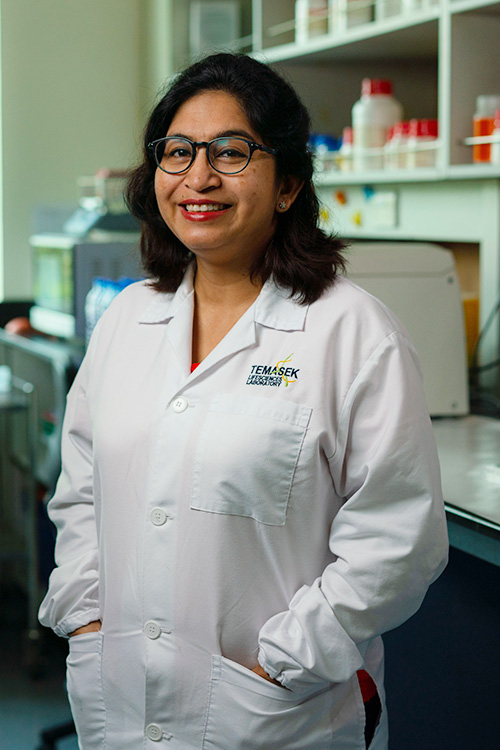
Impact
Climate change and urbanization is endangering the existence and growth of economically valuable plant species. To obtain plant products for pharmaceutical, nutraceutical and cosmetic applications, there is an urgent need to modify and diversify from traditional methods of plant production. Somika aims to contribute to the economic development, well-being and environmental protection of livelihoods with green biotechnology that enhances the production of plants and bioactive compounds sustainably.
Collaborations, Achievements & Honours
- Developed and executed high throughput tissue culture platform for sustainable, large scale, production of economically valuable trees, aiming to enhance production of agroforestry systems and commercial plantations.
- Created platforms for conserving critically endangered native species, enhancing carbon sequestration, improving biodiversity, and reforestation efforts to combat climate change.
- Exploring innovative strategies for in vitro production of bioactive compounds from cell and tissue cultures targeting applications in cosmetics, pharmaceutical and nutraceutical industries,
- Identified biogenic synthesis of nanoparticles with antimicrobial, antidiabetic, anticancer, antioxidant activities and wound dressing potential as well as usage as plant bio stimulant and biofertilizer.
- Research collaborations and commercial contracts with local and regional outreach, including the Singapore National Parks Board, Gardens by the Bay, Temasek Foundation, Citysprouts Singapore, Metro Forestry Thailand and Bioforest Indonesia
- Granted research by Temasek Foundation and the Singapore Economic Development Board (2012 – 2024)
- Research Areas
- Agronomy, Ecological Biology, Genetics & Genomics
Research Areas
Agronomy, Ecological Biology, Genetics & Genomics
Affiliations
- Affiliated Faculty member of Singapore management University Academy.
Question
How do we transform tissue culture strategies for rapid in vitro production of economically valuable plants and phytocompounds?
Approach
Somika’s lab spent the last two decades growing tissue culture in space saving, indoor vertical farming structures. Free from extreme weather conditions, these plants are healthy and disease-free. They also grow faster, have higher biomass and uniform growth. This means that farmers can get the same yield, in a shorter period of time, from a smaller piece of land. Less forestry then needs to be cleared, preserving biodiversity.
However, the extraction of economically important bioactive compounds require plants to grow in field. This approach is currently alienated by growth and production in in vitro cell, tissue cultures and the use of elicitors for enhancement. Green nanoparticles, when synthesized in the lab from medicinal plant extracts, can also demonstrate antibacterial, antioxidant, anticancer, plant growth stimulating and biomass enhancing properties.
Nevertheless, Somika’s lab achieved success in technical know-how transfer and licensing. A spin-off company was set up to produce one million tissue culture plants per annum. Innovative biotechnology platforms produced tissue cultures for large scale sustainable production of timbre, plywood, paper and pulp, rubber, and agarwood plantations. They were also deployed to produce high biomass and carbon sequestration trees for carbon credits and reforestation.
Simultaneously, Somika has successfully propagated critically endangered native tree species for environmental conservation in Singapore. She is also developing tissue and cell culture platforms for sustainable, in vitro production of bioactive pharmaceutical, nutraceutical and cosmetic ingredients.
Bio
Somika received her PhD in Plant Molecular Biology at University of Delhi. Joining TLL as a Research Officer in 2003, she is leading independent groups since 2006. She is currently Head of Plant Transformation and Tissue Culture.
A prominent plant biologist, Somika has over 25 years of experience in life sciences, including leading and mentoring teams of research staff and scholars. An expert in biotechnology, tissue culture, genetic transformation, production of natural compounds in cell cultures and nanotechnology, Somika conducts extensive research in translational plant research areas. These include biotechnology crop development, agroforestry, carbon sequestration, conservation of endangered plant species, biodiversity enhancement, green nanotechnology, and in vitro production of economically important bioactive compounds for cosmetic, pharmaceutical and nutraceutical industries.
Somika is successful in leading various plant science projects and taking research from labs to large-scale sustainable commercial setups, with production capacity of over one million tissue culture plants per annum. Over the years, her research work has led to spin-off company and socially impactful projects. They have also gained international recognition at various speaking events.
Head, Plant Transformation and Tissue Culture
Somika Bhatnagar
The lab focuses on green biotechnology that sustainably produces economically valuable plants and biocompounds.
Group Publications
-
Sustainable phyto-fabrication of silver nanoparticles using Gmelina arborea exhibit antimicrobial and biofilm inhibition activity
Chandrasekharan S, Chinnasamy G and Bhatnagar S.7 January 2022 -
Synthesis, characterization, antibacterial and wound healing efficacy of silver nanoparticles from Azadiracta indica
Chinnasamy G, Chandrasekharan S, Koh TW and Bhatnagar S.19 February 2021 -
Biosynthesis of Silver Nanoparticles from Melia azedarach: Enhancement of Antibacterial, Wound Healing, Antidiabetic and Antioxidant Activities
Chinnasamy G, Chandrasekharan S, Bhatnagar S.11 December 2019 -

